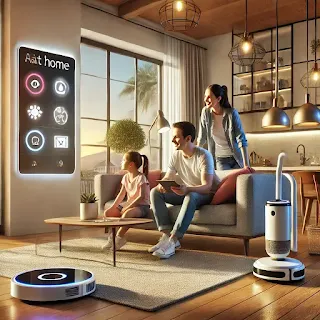How Artificial Intelligence is Revolutionizing Smart Home Technology
- Get link
- X
- Other Apps
How Artificial Intelligence is Revolutionizing Smart Home Technology
Introduction
The integration of Artificial Intelligence (AI) into smart home systems is transforming how people interact with their living spaces. Smart homes, which were once considered futuristic, are now becoming mainstream, offering convenience, security, and efficiency. By leveraging AI, these homes are not just automated but also intelligent, capable of learning, adapting, and making informed decisions to enhance residents' lifestyles.
In this article, we will explore what defines a smart home, the role of AI in its evolution, key applications, benefits, challenges, and future possibilities. Additionally, we’ll link to resources for further understanding and emphasize SEO-friendly practices for our readers.
What is a Smart Home?
A smart home refers to a living environment where devices and systems—such as lighting, heating, security, and appliances—are interconnected and remotely controllable, typically via the Internet of Things (IoT). These homes provide convenience and efficiency by automating tasks that traditionally required manual intervention.
On the other hand, AI refers to systems capable of mimicking human-like reasoning, learning, and decision-making. When combined, these two technologies create smart homes that can predict and respond to the needs and preferences of their residents.
Applications of AI in Smart Homes
1. Personalized Automation
AI enables personalized automation by analyzing user behavior and adapting settings accordingly. For example, a smart thermostat can learn when residents are likely to be home and adjust the temperature for optimal comfort and energy savings.
Learn more: Applications of Artificial Intelligence in Smart Homes
2. Enhanced Security
AI-powered security systems provide a significant upgrade to traditional methods. They can:
- Detect unusual patterns through video analytics.
- Recognize faces to differentiate between residents and strangers.
- Alert homeowners or authorities in real time if a security threat is detected.
Learn more: Challenges of Implementing Smart Homes
3. Energy Management
AI optimizes energy usage by analyzing consumption patterns and suggesting ways to reduce waste. For instance, smart lights turn off when no one is in the room, and appliances adjust their power consumption based on grid demand.
Learn more: AI and Data Analysis in Smart Homes
4. Predictive Maintenance
With AI, homeowners can avoid costly repairs by identifying potential issues before they escalate. For example, a washing machine might alert the homeowner if a part is likely to fail soon, allowing for timely maintenance.
5. Voice-Activated Assistants
Devices such as Amazon Alexa, Google Assistant, and Apple's Siri enable users to control various aspects of their homes through simple voice commands. AI allows these assistants to understand natural language and perform tasks efficiently.
6. IoT Integration
AI connects all smart devices under a single ecosystem, ensuring they work harmoniously. From smart refrigerators to connected entertainment systems, AI ensures optimal functionality and usability.
Learn more: Applications of AI in Smart Homes
 |
|
Benefits of AI in Smart Homes
- Convenience
Automated routines free up time, enabling homeowners to focus on other priorities.
- Energy Efficiency
By optimizing energy usage, AI reduces both environmental impact and utility bills.
- Enhanced Security
AI systems detect and respond to threats faster and more accurately than traditional systems.
- Accessibility
AI-powered devices make homes more accessible for individuals with disabilities, offering voice control and automated assistance.
Challenges of AI in Smart Homes
1. Privacy Concerns
AI systems rely on vast amounts of personal data, raising concerns about how this data is collected, stored, and used.
2. Cybersecurity Risks
As smart devices are connected to the internet, they can be vulnerable to cyberattacks. Robust encryption and regular updates are essential to mitigate these risks.
Learn more: Challenges of Intelligentization
3. High Costs
The initial setup and ongoing maintenance of AI-powered smart homes can be expensive, making them less accessible for some households.
4. Interoperability Issues
Devices from different manufacturers may not always integrate seamlessly, leading to compatibility challenges.
 |
Family enjoying a modern AI-enhanced smart home with automated systems, natural lighting adjustments, and voice-activated convenience |
Future of AI in Smart Homes
The future holds exciting possibilities for AI in smart homes:
- Advanced Learning: AI systems will become more intuitive, understanding complex behaviors and preferences.
- Deeper IoT Integration: Devices will communicate more effectively, creating a cohesive and responsive ecosystem.
- Sustainability: AI will promote green living through energy-efficient solutions.
Conclusion
AI has revolutionized the concept of smart homes, transforming them from mere automated spaces into intelligent ecosystems. While challenges such as privacy and costs persist, advancements in technology and increasing accessibility are making these homes a viable option for many.
By combining convenience, efficiency, and innovation, AI-powered smart homes are set to define the future of living spaces.
- Get link
- X
- Other Apps




Comments
Post a Comment